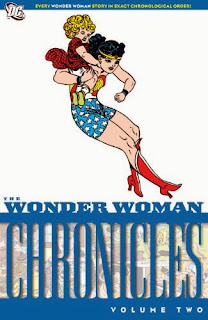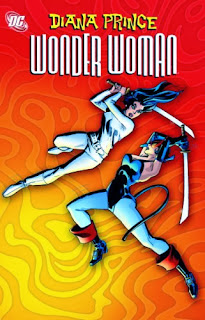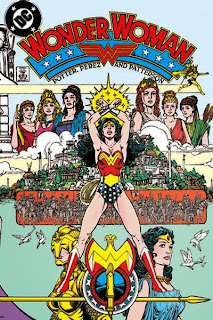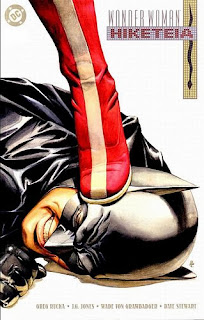As promotion for my forthcoming book on They Might Be Giants'Flood (out this Thursday!), my co-author and I are guest-editing the 33 1/3 blog at 333sound.com this week. That's right, you get double the blogging from me this week. Our first post is here, featuring bits of our interview with the band that didn't fit into the book.
So, you've bought A Golden Thread, my critical history of Wonder Woman. And you're one of the readers who hasn't read any Wonder Woman comics - which is fine, as I wrote the book assuming a reader who hadn't. But now you want to go read some because you're interested.
Or perhaps you haven't bought it yet because you don't know enough about Wonder Woman, but you're curious why I think the topic is so interesting.
Either way, here are my picks for the five Wonder Woman collections/eras somebody interested in knowing more about the fascinating history of the character should read. Or just the five Wonder Woman collections anyone looking for a good comic should read. Really, just read them. Then go buy A Golden Thread. Even if you've bought it already; just buy another copy. They make great Christmas presents.
Image may be NSFW.
Clik here to view. The Wonder Woman Chronicles (Volume 2)
The Wonder Woman Chronicles (Volume 2)
Volume 1 of this series is currently out of print, but the original William Moulton Marston/Harry G. Peter stories don't really require chronological ordering anyway. What's important is that this is nearly two hundred pages of World War II era Wonder Woman by her creators themselves. This is the era of Wonder Woman in which she was a propaganda figure for her creator's imagined female supremacist bondage utopia.
What jumps out about stories in this era is twofold. First is their weird inventiveness. Marston was completely barmy, and his stories are packed with strange and wonderful ideas. Second is the fact that Marston has a radical vision of the world that is as idiosyncratic and sweeping as that of William Blake or Philip K. Dick. Wonder Woman is a part of a larger philosophical and intellectual system for him, and though the full nature of that system isn't clear from the strips alone, they sparkle with a sort of mad passion lacking in any other superhero comic I've read. These are some of the weirdest comics ever to have a major cultural impact.
Image may be NSFW.
Clik here to view. Diana Prince: Wonder Woman (Volume 4)
Diana Prince: Wonder Woman (Volume 4)
One of my favorite parts of A Golden Thread is the two chapters devoted to the so-called I Ching era, a period in the late 60s/early 70s in which Wonder Woman lost her superpowers and adventured as an ordinary human being. This era was pilloried by Gloria Steinem, whose objections were used as a pretext for sacking the creative team and replacing it. In practice, though, the creative team was a bunch of fabulous writers and artists, headed by Denny O'Neil, whose angry leftist take on Green Arrow remains one of the iconic comics of the 1970s. For the last two issues of the era they had Samuel Delaney writing, who was doing one of the most serious-minded feminist takes on the comic ever, before or since. And upon firing them DC replaced them with Robert Kanigher, who promptly created an evil black duplicate of Wonder Woman called "Nubia." It's one of the most spectacular own-goals for feminism ever.
This is the final set of stories from that era, including Samuel Delaney's two-issue run and the appallingly bad Robert Kanigher issue where all of these plot threads are quickly abandoned. (Though not the one introducing Nubia) The entire era is worth looking at, but seeing just how good Samuel Delaney's take on Wonder Woman was and just how stupid what comes immediately after it is fascinating. This is an era of Wonder Woman that shows just how broad the concept is. It pushes the idea of Wonder Woman further than any other era really ever has.Plus it has Wonder Woman and Catwoman teaming up with Fafhrd the Barbarian in a Sword and Sorcery epic. It sells itself.
Image may be NSFW.
Clik here to view. The George Pérez Era (Comixology link)
The George Pérez Era (Comixology link)
That the trade paperback collection of this is out of print speaks volumes about just how poorly DC handle both Wonder Woman and their archival material. Following the universe-wide reboot of Crisis on Infinite Earths, Wonder Woman was revamped by writer-artist George Pérez when, basically, nobody else was interested and he felt like she deserved a high caliber creator. This was Pérez's first book as a writer, and he absolutely killed on it. The comic is dense, with a mythic sweep to it that redefined the character brilliantly. Pérez's take goes back to fundamentals and Greek mythology, but does so in a way that is grounded in the real world and in human experience.
This is not a surprise - the comic was edited by Karen Berger, who had overseen Alan Moore's work on Swamp Thing and Neil Gaiman's Sandman, and matched the sophisticated, mature styles that mark all the work she edits with Wonder Woman's more colorful world. There's an alternate universe wher Wonder Woman was one of the books to make the jump to Vertigo in 1993, and got an extended run as a mature readers comic worked on by the best lights of the industry. Reading this, you see how close it came. This is a comic that is far, far better than it needs to be, and is a classic as a result.
And even if the trades are out of print, you can get it issue by issue from Comixology, with the first issue costing only 99 cents. (Don't be fooled by the zero issue - it does not meaningfully come before #1, and belongs to a later era of the comic)
Image may be NSFW.
Clik here to view.![]() Wonder Woman: The Hiketeia
Wonder Woman: The Hiketeia
Out of print, but at least affordably priced. Rucka is a phenomenal writer who's become known in comics for his well-done female characters, who are not "strong female characters" in the ordinary and frustrating sense, but who are instead rounded and developed characters who are women. His Wonder Woman run is a thing of beauty, even if it was interrupted and then brought to a premature halt by another big DC Universe event and relaunch.
This graphic novel predates his run, and is a stand-alone story of Wonder Woman and Batman (another character he had an iconic run on) coming into conflict over the life of a young woman. Batman is hunting her because she murdered three people. Wonder Woman, meanwhile, is protecting her for her own complex reasons. It is in many ways the themes and vision of the Marston era brought into the present era, and written in a more grounded, mature manner. The contrasts between Wonder Woman and Batman are amazingly well done, with Wonder Woman having a moral code that is at once utterly strange and utterly sensible. Pay attention to how the themes of dominance and submission from the Marston era come back and are updated for the present day. If you buy only one thing on this list, buy this. There should not be a used copy left on Amazon at the end of the day.
Image may be NSFW.
Clik here to view.![]() Wonder Woman Volume 1: Blood
Wonder Woman Volume 1: Blood
Ironically, in amongst the frequently misogynistic and almost universally awful dreck of DC's "New 52" relaunch is Brian Azzarello and Cliff Chiang's take on Wonder Woman, which by several miles the best comic coming out of DC right now. But that's not saying much, so let's try again - there's no era in DC's history where this wouldn't be one of the best books they had coming out.
Azzarello calmly sidesteps the endless navel-gazing that Wonder Woman comics sink into, instead penning an unnerving book of mythological horror. Instead of tediously analyzing what the role of Wonder Woman should be, as virtually ever other Wonder Woman comic does these days, Azzarello just tells a rolicking story that features Wonder Woman as its main character. He has a clear ear for her, capturing much of the essence of the character without ever having to indulge in patting himself on the back for how well he writes her. Instead the book displays a steely confidence that has made every issue a solid read. And the art is phenomenal, particularly in its unnervingly haunting depictions of the Greek gods. Buy it. Catch up. And then start grabbing the new issues.
So, you've bought A Golden Thread, my critical history of Wonder Woman. And you're one of the readers who hasn't read any Wonder Woman comics - which is fine, as I wrote the book assuming a reader who hadn't. But now you want to go read some because you're interested.
Or perhaps you haven't bought it yet because you don't know enough about Wonder Woman, but you're curious why I think the topic is so interesting.
Either way, here are my picks for the five Wonder Woman collections/eras somebody interested in knowing more about the fascinating history of the character should read. Or just the five Wonder Woman collections anyone looking for a good comic should read. Really, just read them. Then go buy A Golden Thread. Even if you've bought it already; just buy another copy. They make great Christmas presents.
Clik here to view.
 The Wonder Woman Chronicles (Volume 2)
The Wonder Woman Chronicles (Volume 2)Volume 1 of this series is currently out of print, but the original William Moulton Marston/Harry G. Peter stories don't really require chronological ordering anyway. What's important is that this is nearly two hundred pages of World War II era Wonder Woman by her creators themselves. This is the era of Wonder Woman in which she was a propaganda figure for her creator's imagined female supremacist bondage utopia.
What jumps out about stories in this era is twofold. First is their weird inventiveness. Marston was completely barmy, and his stories are packed with strange and wonderful ideas. Second is the fact that Marston has a radical vision of the world that is as idiosyncratic and sweeping as that of William Blake or Philip K. Dick. Wonder Woman is a part of a larger philosophical and intellectual system for him, and though the full nature of that system isn't clear from the strips alone, they sparkle with a sort of mad passion lacking in any other superhero comic I've read. These are some of the weirdest comics ever to have a major cultural impact.
Image may be NSFW.
Clik here to view.
 Diana Prince: Wonder Woman (Volume 4)
Diana Prince: Wonder Woman (Volume 4)One of my favorite parts of A Golden Thread is the two chapters devoted to the so-called I Ching era, a period in the late 60s/early 70s in which Wonder Woman lost her superpowers and adventured as an ordinary human being. This era was pilloried by Gloria Steinem, whose objections were used as a pretext for sacking the creative team and replacing it. In practice, though, the creative team was a bunch of fabulous writers and artists, headed by Denny O'Neil, whose angry leftist take on Green Arrow remains one of the iconic comics of the 1970s. For the last two issues of the era they had Samuel Delaney writing, who was doing one of the most serious-minded feminist takes on the comic ever, before or since. And upon firing them DC replaced them with Robert Kanigher, who promptly created an evil black duplicate of Wonder Woman called "Nubia." It's one of the most spectacular own-goals for feminism ever.
This is the final set of stories from that era, including Samuel Delaney's two-issue run and the appallingly bad Robert Kanigher issue where all of these plot threads are quickly abandoned. (Though not the one introducing Nubia) The entire era is worth looking at, but seeing just how good Samuel Delaney's take on Wonder Woman was and just how stupid what comes immediately after it is fascinating. This is an era of Wonder Woman that shows just how broad the concept is. It pushes the idea of Wonder Woman further than any other era really ever has.Plus it has Wonder Woman and Catwoman teaming up with Fafhrd the Barbarian in a Sword and Sorcery epic. It sells itself.
Image may be NSFW.
Clik here to view.
 The George Pérez Era (Comixology link)
The George Pérez Era (Comixology link)That the trade paperback collection of this is out of print speaks volumes about just how poorly DC handle both Wonder Woman and their archival material. Following the universe-wide reboot of Crisis on Infinite Earths, Wonder Woman was revamped by writer-artist George Pérez when, basically, nobody else was interested and he felt like she deserved a high caliber creator. This was Pérez's first book as a writer, and he absolutely killed on it. The comic is dense, with a mythic sweep to it that redefined the character brilliantly. Pérez's take goes back to fundamentals and Greek mythology, but does so in a way that is grounded in the real world and in human experience.
This is not a surprise - the comic was edited by Karen Berger, who had overseen Alan Moore's work on Swamp Thing and Neil Gaiman's Sandman, and matched the sophisticated, mature styles that mark all the work she edits with Wonder Woman's more colorful world. There's an alternate universe wher Wonder Woman was one of the books to make the jump to Vertigo in 1993, and got an extended run as a mature readers comic worked on by the best lights of the industry. Reading this, you see how close it came. This is a comic that is far, far better than it needs to be, and is a classic as a result.
And even if the trades are out of print, you can get it issue by issue from Comixology, with the first issue costing only 99 cents. (Don't be fooled by the zero issue - it does not meaningfully come before #1, and belongs to a later era of the comic)
Image may be NSFW.
Clik here to view.
 Wonder Woman: The Hiketeia
Wonder Woman: The HiketeiaOut of print, but at least affordably priced. Rucka is a phenomenal writer who's become known in comics for his well-done female characters, who are not "strong female characters" in the ordinary and frustrating sense, but who are instead rounded and developed characters who are women. His Wonder Woman run is a thing of beauty, even if it was interrupted and then brought to a premature halt by another big DC Universe event and relaunch.
This graphic novel predates his run, and is a stand-alone story of Wonder Woman and Batman (another character he had an iconic run on) coming into conflict over the life of a young woman. Batman is hunting her because she murdered three people. Wonder Woman, meanwhile, is protecting her for her own complex reasons. It is in many ways the themes and vision of the Marston era brought into the present era, and written in a more grounded, mature manner. The contrasts between Wonder Woman and Batman are amazingly well done, with Wonder Woman having a moral code that is at once utterly strange and utterly sensible. Pay attention to how the themes of dominance and submission from the Marston era come back and are updated for the present day. If you buy only one thing on this list, buy this. There should not be a used copy left on Amazon at the end of the day.
Image may be NSFW.
Clik here to view.
 Wonder Woman Volume 1: Blood
Wonder Woman Volume 1: BloodIronically, in amongst the frequently misogynistic and almost universally awful dreck of DC's "New 52" relaunch is Brian Azzarello and Cliff Chiang's take on Wonder Woman, which by several miles the best comic coming out of DC right now. But that's not saying much, so let's try again - there's no era in DC's history where this wouldn't be one of the best books they had coming out.
Azzarello calmly sidesteps the endless navel-gazing that Wonder Woman comics sink into, instead penning an unnerving book of mythological horror. Instead of tediously analyzing what the role of Wonder Woman should be, as virtually ever other Wonder Woman comic does these days, Azzarello just tells a rolicking story that features Wonder Woman as its main character. He has a clear ear for her, capturing much of the essence of the character without ever having to indulge in patting himself on the back for how well he writes her. Instead the book displays a steely confidence that has made every issue a solid read. And the art is phenomenal, particularly in its unnervingly haunting depictions of the Greek gods. Buy it. Catch up. And then start grabbing the new issues.
